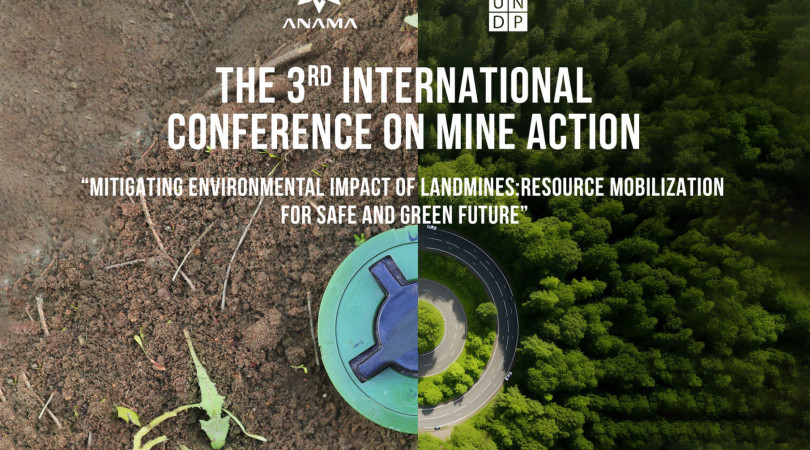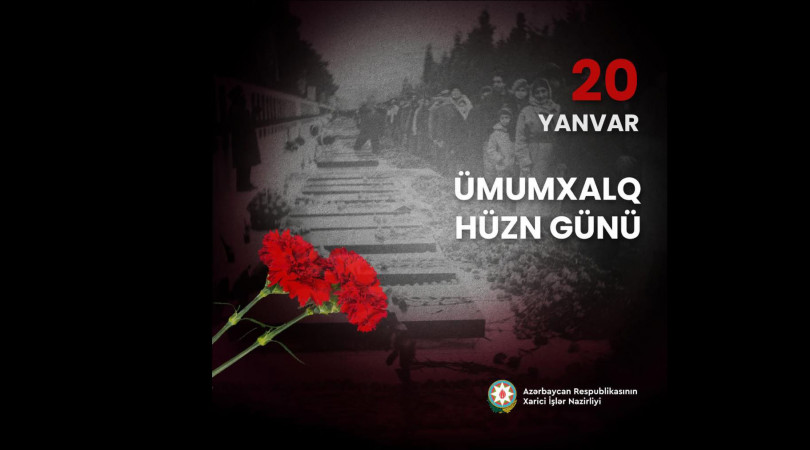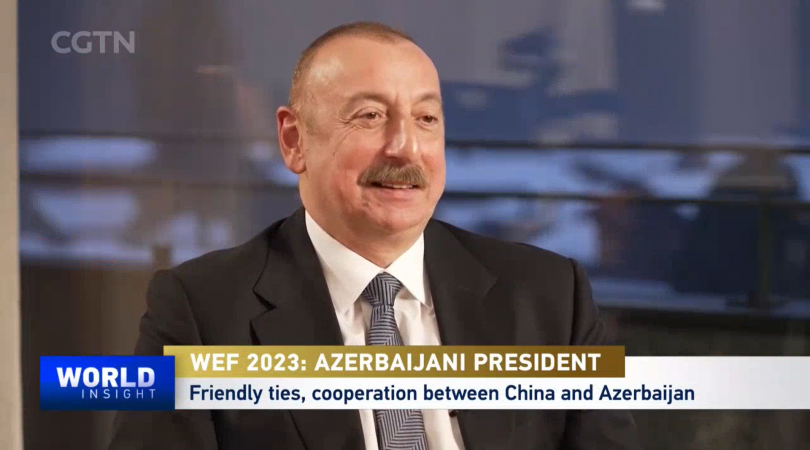STATEMENT of the Commissioner for Human Rights (Ombudsman) of the Republic of Azerbaijan regarding 31 March - the Day of Genocide against Azerbaijanis
The Republic of Azerbaijan had great opportunity to study own history after became independent so, gradually all hidden facts were disclosed and the distorted events became clearly seen. The genocide which has been gradually committed against our people and that has not been yet recognized is one of such examples.
The purposeful massacre, ethnic cleansing and deportation policy of Armenian nationalists and their supporters against the Azerbaijanis lasted more than two centuries were aimed at banishing the Azerbaijanis from their historical native lands and establishing "Great Armenia" State.
Since 1988, due to Armenian aggression policy against Azerbaijan, 20 percent of territories of the country, including Nagorno Karabakh and seven surrounding districts were occupied; hundred thousands of our people became refugees and IDPs.
The most horrible tragedies against Azerbaijanis are the acts of genocide committed by Armenians from March 31, 1918. Armenians skillfully used the February and October Revolutions of 1917 in Russia achieved their claims under the flag of Bolsheviks. Since March of 1918 the repellent plan about removing of Azerbaijanis from Baku province had been implemented under the slogan of the Baku Community to fight against anti-revolutioners. Thousands of Azerbaijani civilians were murdered on the ground of their ethnicity; the houses were set fire and the people were burned alive. Rare historical monuments, schools, hospitals, mosques were ruined.
The massacres committed by the Armenian-Bolshevik forces in Baku gained mass scale on March 31 and April 1-2 and innocent civilians were killed mercilessly.
During those massacres, hundred thousands of our compatriots in the whole territory of Azerbaijan, including 30 000 persons in Baku and in surrounding villages were brutally murdered on the ground of nationality. During March slaughters Armenians caught many old buildings, including the Ismailiya building, which is one of the pearls of the world architecture on shelling. As a result of shootings by the military navy located in the Caspian Sea, the Minarets of Juma and Tazapir mosques were severely damaged. The corps of the people killed in caravansary by Dashnak armed forces were burned in the same place.
The acts of genocide of Azerbaijanis mainly committed in Baku, Shamakhi, Guba, Kurdamir, Salyan, Karabakh, Zangezur, Nakhchivan and Lankaran provinces with special cruelty. During March events, 75 villages of Shamakhi were totally destroyed. Research documents in 7 Volumes and 925 pages about the acts of genocide committed in Shamakhi and in neighboring villages stored in the archives once more evidenced the large scale of the massacres. According to the historical sources, the 60 trucks of ammunition and 2000 Armenian armed forces sent to Shamakhi in the middle of March is a proof of preparation to this massacre in advance.
115 villages in Zangezur province were destroyed and all property of peaceful Muslim population was looted.
In Guba province these bloody events also occurred at the same scale, the Armenian armed groups burned 122 villages, killed 60 men, women and children and injured 53 persons. In general, in that period about 700 people were massacred in the whole Azerbaijani territory.
Girdani, Veravul, Vilvan villages of Lankaran province and in general about 40 villages were destroyed, hundreds of innocent civilians were killed and numerous houses were plundered and burned. In spite of years passed those bloody events were not forgotten and left indelible impressions in memory of our people.
Within last period, there were recently found evidences ascertained mass slaughter committed by Armenians during March events in 1918 in Guba province. Innumerable human bones found are visual evidences of the Armenian vandalism. There was created "Massacre Memorial Complex" as a respect to the memory of those persons killed there in the period of March incidents. The newly opened Memorial Genocide Museum at the Azerbaijan Republic Military Prosecutor's Office also plays significant role in informing the international community about historical truths of the country, including massacres and manslaughters committed by the Armenian nationalists against our people.
The Decree signed by the National Leader of Azerbaijan Haydar Aliyev on "Genocide against Azerbaijanis" dated 26 March 1998, provided political recognition to these events and for the first time officially declared the fact of the genocide against Azerbaijanis committed by Armenians. So, 31 March is annually commemorated as the date of genocide against the Azerbaijanis at the state level.
Under the international law, as a grave international crime, genocide is included to such group of crimes as aggression against the international peace and security, crime against humanity, war crimes and international terrorism. The legal definition of the crime of genocide was found in the Convention "on the Prevention and Punishment of the Crime of Genocide" adopted by the UN General Assembly Resolution No. 260 (III) dated 9 December 1948. As it is enumerated by the Convention, genocide is an act committed with intent to destroy, in whole or in part, a national, ethnic, religious, or racial group. Each action that is an element of the crime against humanity and is envisaged in this document was committed by Armenians against Azerbaijanis during March events in 1918 and should be recognized as genocide from the legal perspective.
These events evidenced that Armenian nationalists did not give up their notorious purposes, massacred civilians by cruel methods and falsified the history converting facts to their own use to curtain the crime committed.
The occupied Nagorny Karabakh and surrounding provinces are the integral part of Azerbaijan. Although, the UN Security Council adopted four Resolutions on territorial integrity and unconditional liberation of the occupied territories of Azerbaijan, the UNGA adopted the Resolution titled "the Situation in the occupied territories of Azerbaijan" of March 14, 2008, the Parliamentary Assembly of Council of Europe (PACE) adopted a Resolution No. 1416 and a Recommendation No. 1690 confirming the occupation of the Azerbaijani territories by the Armenian armed forces and governing the Nagorno-Karabakh by separatists, Armenia still refuses to fulfill the requirements of these documents. However, in these Resolutions, Armenia was recognized as an aggressor and was demanded to withdraw its military forces from the occupied Azerbaijani territories and to create possibilities for one million Azerbaijani refugees and IDPs to return to their native lands.
The Azerbaijani side always tries for peaceful solution to the conflict. The country President Ilham Aliyev repeatedly declared that we would achieve the restoration of our territorial integrity.
World community provides more support for the just position of Azerbaijan and it is interested in peaceful settlement to this conflict within the international legal norms. EU has repeatedly declared its will to actively participate in the solution of Nagorny Karabakh conflict and to establish trust between the parties to the conflict.
This should be noted that the US New York State Senate and New Jersey State General Assembly passed Resolutions recognizing the 31 March as a Day of Genocide of Azerbaijanis.
We once more declare this genocide has not been yet given legal assessment at the international level. Requesting the world community and international organizations, we believe that long-lasting Armenian aggression against Azerbaijan, mass human rights violations will be ended and this long-standing conflict will be solved by peaceful and reconciliation means.
We urge international organizations to support the just position of Azerbaijan without double standards and believe that justice will be restored soon, this violent crime committed against humanity will be given international legal assessment as an act of genocide, the perpetrators will be punished, the competent international organizations will impose sanctions on Armenia, the severely violated rights of hundred thousands of refugees and IDPs will be restored and prisoners of war and hostages will be released.
We hope international organizations as well as peacemakers will join efforts for the restoration of peace and security in Azerbaijan. The necessary condition will be achieved for the peace, sustainable development and cooperation in our country and in the region. Real opportunities will be created for the promotion of the universally recognized fundamental human rights and freedoms of everyone without discrimination on any ground.
Elmira Suleymanova
Commissioner for Human Rights
(Ombudsman)
of the Republic of Azerbaijan
29.03.2016
The Statement is addressed to the Secretary-General of the United Nations, United Nations Security Council, the United Nations High Commissioner for Human Rights, UN Human Rights Council, European Commission, Council of Europe, OSCE, International Ombudsman Institute, European Ombudsman Institute and Asian Ombudsman Association, International Peace Bureau, International Peace Federation, Ombudspersons of foreign countries, Embassies of Azerbaijan abroad, as well as the foreign Embassies in Azerbaijan, and organizations of Azerbaijani Diaspora.


















